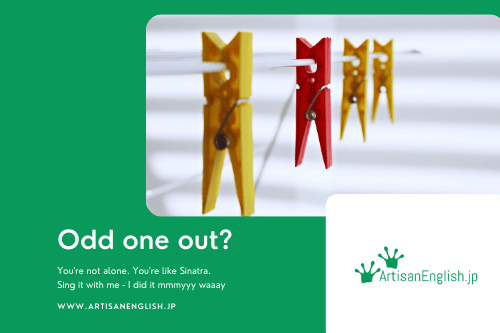
YouTube / iTunes / Spotify / Radio Public / Pocket Casts / Google Podcasts / Breaker / Overcast
Listen to ArtisanEnglish.jp posts & lesson intros here.
Phrase: The odd one out
Estimated reading time: 3 minutes
One of the biggest misconceptions of North Americans is that everyone has a very strong sense of independence and individuality.
Yes, there are many more Canadians and Americans than Japanese who do not mind being the odd one out in a situation, but not everyone feels that way.
Many long to be a part of a group.
Here in Japan, doing your own thing, going against the grain or following your path in life is often frowned upon at best and outright condemned at worst.
It’s the same in North America with one difference.
Being the odd one out is only condemned if you are unsuccessful.
Everybody loves a winner, and if you are a successful person who can say ‘I did it my way’ like Frank Sinatra, you will be praised.
Blaze your trail to find only ruin, and North Americans will turn on you in a heartbeat.
If you are the odd one out, you are different from or not part of a particular group.
This is good in some situations and not so good in others.
As I write this, a message came up on my screen.
Six of the G7 nations have condemned China’s infringement on the human rights of the Uighurs.
They have also taken steps to make economic sanctions against China.
The G7 is called the G7 because it has seven members.
These seven members should stand and fall together.
They should present a united front to uphold democratic freedoms in the world.
Who is the odd one out?
Japan is the odd one out.
Japan is the only member to do nothing.
Is it reasonable to be the odd one out in this situation?
I’ll leave it up to you to decide.
Flesch-Kincaid Readability Test
This post is understandable by someone with at least a 7th-grade education (age 12).
On the Flesch-Kincaid reading-ease test, this post scores 74.
The easier a passage is to read, the higher the score on a scale of 0 – 100.